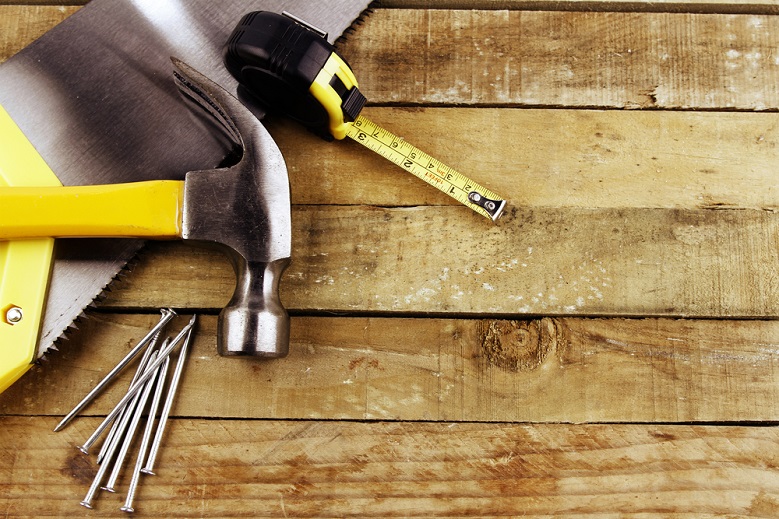
By Ethan Roberts
Whether you’re rehabbing a home to flip, rent out, or even live in, one of the most important tasks you face is maximizing the home’s appearance while staying within your budget. The last thing you want to do is spend too much repairing a home, only to discover when you resell it that your total profit will be nominal.
Today, I’m going to share how to develop the skills to properly estimate your rehabbing costs before you even make an offer.
Why Accurate Estimations of Repair Costs are Vital
One of the most common errors that I see new investors make is inaccurately estimating structural repair costs like re-roofs, re-plumbs, and heating and cooling system replacements, as well as cosmetic enhancements such as paint, new flooring, and fixtures.
I’m amazed at how often inexperienced buyers get it wrong when they’re looking at a property. Usually they overestimate the costs associated with fixing up the home. Some may do it out of ignorance, but some who know better do it in an effort to justify making a low-ball offer on a property. On the other hand, underestimating costs is just as harmful. Either way, you’re setting yourself up for investment failure.
Here’s why: If you underestimate the costs of rehabbing a house, you’ll spend weeks rehabbing it, but you’ll find when you resell it that your profit will be far less than you expected. That could seriously dissuade you from ever wanting to take on another flipping project and derail what could be a promising way to build wealth.
Conversely, if you overestimate the cost of a project, you might either make a bid that’s too low to be accepted by the seller, or be beaten out of the deal by a rival investor who estimated costs correctly and was thus able to outbid you. You might even decide to pass on a property that would have made you a good profit. Good deals take a long time to find, so a lost opportunity can be costly!
Estimating Material, Labor and Overall Costs
The best way to learn how to estimate material costs correctly is by spending a lot of time at your local home improvement stores, walking the aisles to see what typical rehabbing materials actually cost. Bring a notebook and pen and write down the range of costs of materials such as carpet, tile, laminate, paint, blinds, vanities, fixtures, and ceiling fans. When you get home, put these costs into a spreadsheet, so you’ll always be able to access them.
In order to learn about labor costs, you should talk with other investors and real estate professionals to learn which contractors they use and like. Network with these local service providers to find out what their usual charges are, and team up with those who can do a dependable, quality job at the lowest possible cost to you.
Next, let’s estimate jobs the way that contractors do—by listing a range of costs for each repair, rather than one fixed price. For example, the cost of new light fixtures on a 1,500-square-foot house could range from $500 to $1,000, depending on the quality, number of fixtures needed, value of the surrounding neighborhood, who will install the fixtures, and your ability to find the materials on sale.
Here are the steps you should take:
First, compile the total list of materials needed, and record a high and low price estimate for each. Once that’s done, add both columns of numbers to get the total cost for both high and low. Then add the two totals, and then divide by two to get the average cost.
Thus, if the fixtures range from $500 to $1,000, we add $500 + $1,000 = $1,500. Divide that figure by two to get $750.
The actual cost may ultimately be higher or lower than $750, but that’s the most accurate way to figure the approximate cost.
Here’s an example of this method, using five typical repair items.
| Materials | Low | High |
| Paint | $1,000 | $1,200 |
| Carpet | $2,000 | $2,500 |
| Tile | $700 | $1,200 |
| Doors | $200 | $400 |
| Windows | $300 | $400 |
| Total Costs | $4,200 | $5,800 |
We then add $4,200 + $5,800 = $10,000 and divide that number by two. Your total rehabbing cost for the items above would be approximately $5,000.
Expect Costs to Fluctuate
One thing you’ll find on each home you flip is that some of your estimates will be low because of unexpected problems or repairs that you didn’t count on, while other large costs you anticipated might prove to be less expensive than your original estimates.
I can remember times when I thought an air conditioning unit might need replacing for $3,000–$4,000, only to happily learn that a simple $200 repair made it work like new. Also, by shopping carefully across a number of stores, using credit cards that offer a discount and buying items when they’re on sale, I usually manage to find materials that reduce the costs below my original numbers.
Here’s an important tip. Since the more time you own a property before the re-sale, the higher your expenses like taxes, insurance, utilities, and maintenance become, the faster you get it done, the bigger your profit will be. So buy all of your materials in advance, but make sure you can return everything you buy. I once spent $500 on custom cabinet doors prior to a closing because I wanted to get a head start on rehabbing, only to learn a week before we closed that title problems were going to keep us from closing at all. That was money wasted!
Finally, keep in mind that you can spend a little more on a home that you’re going to flip rather than rent, because you’ll get the return on your dollars more quickly on a flip.
These lessons will help you to win more offers and ultimately increase your profits on all of your real estate investments. Good luck!

Ethan Roberts is a real estate writer, editor and investor. He’s a frequent contributor to InvestorPlace, and his work has been featured on MSN Money and Reuters. He’s also written for Seeking Alpha, Investopedia, The Fiscal Times, ForSaleByOwner and Smarty Cents, and was one of five contributing editors to The Tycoon Report. He’s been investing in real estate since 1995 and has been a Realtor since 1998. He also teaches classes on investing in residential real estate.

